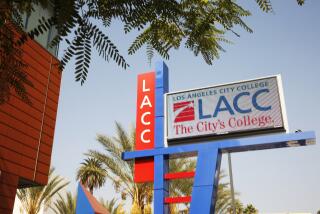Criteria for College Scholarships
- Share via
Henry E. Riggs (president of Harvey Mudd College) stresses that tuition discounts should be based on need in “Why Squander Aid on Those Who Can Pay?” (Commentary, Feb. 21). What Riggs fails to do is define “need.” Does a student whose parents have a lavish home, luxury cars and travel extensively, yet failed to save for their child’s education, deserve a need-based scholarship? What about a family of many children where the parents have lived modestly, often sacrificing vacations and luxuries in order to save for their children’s education? How does Riggs define “ affluent families who can well afford the tuition”?
Students with extreme financial need already receive federal and state aid. What is wrong with institutions rewarding students who have worked hard and excelled in high school with merit scholarships? Academic qualifications can be clearly defined, unlike need. Also, the academically qualified students will most likely earn degrees and contribute to the success of the university.
JAN REISDORF
Mission Viejo
* Riggs argued for need-based, rather than merit-based, scholarships. This is an issue we all must consider seriously. What should be the goal of a university? To educate only the very best among our children? To educate equal percentages of the poor, or of minorities? To compete with other universities to achieve the best faculty and the strongest students? Should all universities have the same goals? We have the best university-level educational system in the world. How do we best preserve and improve upon it for the future?
Our current educational system offers many levels of academic challenge. I believe the best interests of this country are served when the goal of at least our “best” schools (such as Harvard, MIT, Caltech, Northwestern, and, yes, Harvey Mudd) is to compete for the best students and the best faculty. The need-based scholarships and admission quotas in use at many of our best schools today do not support this goal. These schools are popular and have severely limited space. If they favor less qualified, but more “needy” students, over more qualified students, they “steal” opportunities to have the best study with the best and to be taught by the best. This is unfair.
Perhaps Riggs should reassess his college’s goals and who the customers are for the product of his college. In our global economy, the business community of this country needs access to a spectrum of college-educated people, including our few best people, educated in our best universities.
MICHAEL E. SMITH
Mission Viejo
More to Read
Sign up for Essential California
The most important California stories and recommendations in your inbox every morning.
You may occasionally receive promotional content from the Los Angeles Times.










